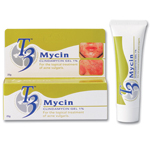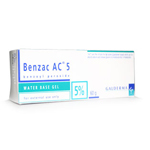Medical management
 Antibiotics
AntibioticsAntibiotics are used for inflammatory acne – pink lumps and bumps which may be small or in more serious cases, may appear as nodules or cysts.
Antibiotics have been used in acne management for decades, however there is a recent trend to use shorter courses, usually three to six months of treatment.
Antibiotics work by controlling the bacterial infection that contributes to acne. They also have an anti-inflammatory action, which can reduce the redness, swelling and pain.
Antibiotic gels and lotions are applied directly onto the skin (eg, Clindatec, Eryacne, Dalacin). Those currently used for the treatment of acne contain the active ingredients clindamycin or erythromycin.
They should be used sparingly on a cool, dry face to minimise irritation. Using topical antibiotics avoids any side effects that may occur with oral antibiotics, however they may take longer to become effective.
Antibiotic tablets/capsules include tetracycline (eg, Tetrex Achromycin), doxycycline (eg, Doxy, Doryx, Vibratabs) and minocycline (eg, Minomycin, Akamin). Bactrim is less commonly used by some doctors, as is erythromycin.
A number of different antibiotics are available and a doctor will recommend the most suitable product for you.
If one antibiotic does not improve your acne, your doctor may change you to a different one, which may be more effective.
A four to six week trial is usually needed to work out if a certain treatment will work well. These medications are usually helpful and only occasionally cause significant side effects.
 Cleansing - sample product,Cetaphil by Galderma
Cleansing - sample product,Cetaphil by GaldermaIt is often overlooked, but effective cleansing is the most important part of keeping mild acne under control.
Limit cleansing your face to
* In the morning - this ensures you remove the remainder of any overnight acne treatments. These treatments can make skin more sensitive to sunlight and sunburn, particularly if left on the skin during the day.
* In the evening - to remove sunscreen and make up residue. Even products said to be suitable for acne prone skin, if left on, can sometimes worsen acne by clogging and irritating pores.
* After hot, sweaty activities.
 Topical antibiotics - sample product, T3 mycin by HOE Pharmaceuticals
Topical antibiotics - sample product, T3 mycin by HOE PharmaceuticalsExternally applied antibiotics such as erythromycin, clindamycin, Stiemycin or tetracycline aim to kill the bacteria that are harbored in the blocked follicles. Whilst topical use of antibiotics is equally as effective as oral, this method avoids possible side effects of stomach upset or drug interactions (e.g. it will not affect the oral contraceptive pill), but may prove awkward to apply over larger areas than just the face alone.
 Topical Bactericidals - sample product, Benzac AC 5 by Galderma
Topical Bactericidals - sample product, Benzac AC 5 by GaldermaWidely available OTC bactericidal products containing Benzoyl peroxide may be used in mild to moderate acne. The gel or cream containing benzoyl peroxide is rubbed, twice daily, into the pores over the affected region and primarily prevents new lesions by killing P.acnes. Unlike antibiotics, Benzoyl peroxide has the advantage of being a strong oxidiser (essentially a mild bleach) and thus does not appear to generate resistance. However, it routinely causes dryness, local irritation and redness. A sensible regimen may include the daily use of low-concentration (2.5%) benzoyl peroxide preparations, combined with suitable non-comedogenic moisturisers to help avoid overdrying the skin.
Care must be taken when using Benzoyl peroxide, as it can very easily bleach any fabric or hair it comes in contact with.Other antibacterials that have been used include triclosan, or chlorhexidine gluconate but these are often less effective.
*For Malaysian Citizen,visit your local doctor/pharmacy or email me at mixterr_gilerr[at]yahoo.com for details info about the product.












5 Comments:
At 10:36 AM, Unknown said…
Unknown said…
Another good source for acne treatment techniques can be found in Aesthetic VideoSource's DVDs on skin care and acne treatment.
For a complete listing of our videos, visit: http://www.videoshelf.com/
At 12:58 PM, Anonymous said…
Anonymous said…
The type of Acne scar treatment to be performed by your dermatologist will dependent on the type of acne scar involved. The dermatologist will also examine the depth to which the scar had inflicted on the skin. Sharps Waste Disposal Chesapeake Va
At 4:13 AM, The Body Clinic said…
The Body Clinic said…
Thanks to share this information with us.
If Are you looking for the best facials for acne? Why, let me tell you then that you are at the right place because I am an expert in best facials treatment
.if anyone is looking to best facials for acne do visit our site.
At 4:09 AM, Online Generic Medicine said…
Online Generic Medicine said…
Acne is a very common problem in the world and people want to relieve this. I also have an acne problem and I am using generic medicines, they work very well. Generic Medicines like Isotretinoin online are used to treat severe nodular acne and buy supatret online it’s used to treatment of acne. If anyone wants to buy these medicines, checkout Online Generic Medicine, They provide all types of generic medicines and best in class products at affordable prices.
At 4:41 AM, Healthytips said…
Healthytips said…
Thanks for sharing such beautiful information with us. I hope you will share some more information about acne. Please keep sharing.
Health Is A Life
Post a Comment
<< Home